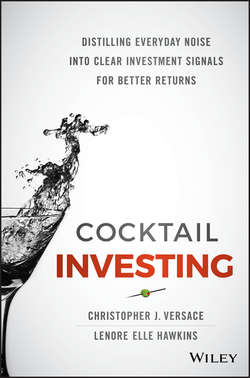Cocktail Investing

Реклама. ООО «ЛитРес», ИНН: 7719571260.
Оглавление
Hawkins Lenore Elle. Cocktail Investing
Preface
Acknowledgments
Chapter 1. Money
Savings and Debt
State of Savings in the United States
The Rules Have Changed
Cocktail Investing Bottom Line
Chapter 2. Getting Started
First Step: Saving
Second Step: Investing
Cocktail Investing Bottom Line
Chapter 3. The Economy versus the Markets
Economic Ideology
Schools of Economic Thought
Comparing Economic Theories
The Economy versus the Market
Cocktail Investing Bottom Line
Chapter 4. Read the Economy Like a Pro
Don't Trust the “Experts”
Vector and Velocity
Breaking It Down
Going Global
Data Corroboration
Cocktail Investing Bottom Line
Chapter 5. The Impact of Politics and Regulation on Investing
Monetary Policy
Fiscal Policy
Regulatory Policy
Cocktail Investing Bottom Line
Chapter 6. Enabling and Disruptive Technologies
The Evolution into Mobile
Data Proliferation
The App Revolution
Rules of Thumb
Cocktail Investing Bottom Line
Chapter 7. Profiting from Pain
Newspapers
Cybersecurity
Water
Changing Demographics
Changing Consumer Preferences
Cocktail Investing Bottom Line
Chapter 8. Cocktail Thematic Investing
Let's Go Online Shopping
Shifting Perspectives
Multiple Cocktail Thematics
Signposts
Cocktail Investing Bottom Line
Chapter 9. Designing Your Portfolio
Number of Securities
Risk Tolerance
Stocks
Real Estate Investment Trusts
Master Limited Partnership (MLP)
Funds
Cocktail Investing Bottom Line
Chapter 10. Choosing Your Investments
12 Questions You Need to Answer When Looking to Buy a Stock
Case Study: Starbucks Corp
Individual Stocks versus Funds
Cocktail Investing Bottom Line
Chapter 11. Building the Portfolio
Monitoring the Trend
Monitoring the Company
Monitoring the Stock Price
Sell or Buy More?
Cocktail Investing Bottom Line
Cocktail Investing Final Thoughts
Appendix: Definitions, Metrics, and Resources
Chapter 2
Chapter 9
Economic Indicators and Data Sources
About the Authors
Отрывок из книги
My focus sharpened as I ascended the steps to the presentation platform. I may have some generous delusions about myself, but I am pretty clear that seeing me trip backside-over-tea-kettle in a skirt and stilettos when trying to mount the all-of-five steps up to the stage where the other panelists were sitting would not exactly give the audience the image of a highly competent woman I'd like to convey.
Hating to be the first to speak, I always try to sit farthest from the moderator in the hope that he or she will get to me later on and give me a chance to come up with something funny or memorable in response to what another panelist has stated with total conviction: my inner–Conference Katniss gets competitive. Damn it, though, some guy with a cocksure grin had taken the spot I covet. I grumbled internally and took the seat next to him. Nonchalant chit-chat ensued, as usual, between the panelists as we waited for the presentation hall to fill. In my Katniss-mind, this lull before the action is akin to that of the Roman gladiators prior to their entrance into the Coliseum. With my usual level of pre–public speaking adrenaline flowing, the reality that the average fitness level of those of us on stage was somewhere around that of The Big Bang Theory's Sheldon Cooper was irrelevant.
.....
Another easy factor to observe is that we are simply living longer lives.
If you don't see that when you are out and about in your daily lives – well we've got some data to share with you. According to a report from the Stanford Center on Longevity (SCL), in 1950 a 65-year-old man could expect to live to age 78, or an additional 13 years. By 2010, a man age 65 could expect to live to age 82, or 17 years longer. A woman age 65 in 1950 could expect to live another 15 years, to age 80, but by 2010 her life expectancy was 84.
.....